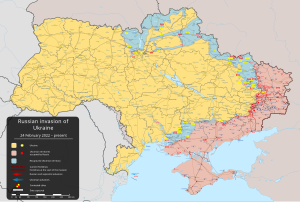

- In Moldova: Transnistria (1), since 1992
- In Georgia: Abkhazia (2) and South Ossetia (3), since 2008
- In Ukraine: Crimea (4) and parts of Luhansk Oblast (5) and Donetsk Oblast (6) since 2014, and parts of Zaporizhzhia Oblast (7) and Kherson Oblast (8) since 2022
The Russian-occupied territories of Ukraine are areas of southern and eastern Ukraine that are controlled by Russia as a result of the Russo-Ukrainian War and the ongoing invasion. In Ukrainian law, they are defined as the "temporarily occupied territories". As of 2024, Russia occupies almost 20% of Ukraine and about 3 to 3.5 million Ukrainians are estimated to be living under occupation;[1][2] since the invasion, the occupied territories lost roughly half of their population. The United Nations Human Rights Office reports that Russia is committing severe human rights violations in occupied Ukraine, including arbitrary detentions, enforced disappearances, torture, crackdown on peaceful protest and freedom of speech, enforced Russification, passportization, indoctrination of children, and suppression of Ukrainian language and culture.[3]
The occupation began in 2014 with Russia's invasion and annexation of Crimea, and its de facto takeover of Ukraine's Donbas[4] during a war in eastern Ukraine.[5] In 2022, Russia launched a full-scale invasion. However, due to fierce Ukrainian resistance and logistical challenges[6] (e.g. the stalled Russian Kyiv convoy), the Russian Armed Forces retreated from northern Ukraine in early April.[7] In September 2022, Ukrainian forces launched the Kharkiv counteroffensive and liberated most of that province.[8] Another southern counteroffensive resulted in the liberation of Kherson that November.
On 30 September 2022, Russia announced the annexation of Donetsk, Luhansk, Zaporizhzhia and Kherson provinces, despite only occupying part of the claimed territory. The UN General Assembly passed a resolution rejecting this annexation as illegal and upholding Ukraine's right to territorial integrity.[9]
As of 2024, Ukraine's peace terms call for Russian forces to leave the occupied territories. Russia's terms call for it to keep all the land it occupies, and be given all of the provinces that it claims but does not fully control.[10] Several Western-based analysts say that allowing Russia to keep the land it seized would "reward the aggressor while punishing the victim" and encourage further Russian expansionism.[11][12]
- ^ Fredrik Wesslau (24 February 2024). "There Must Be a Reckoning for Russian War Crimes". Foreign Policy.
- ^ Nikolay Petrov (5 September 2024). "Russia in the Occupied Territories of Ukraine: Policies, Strategies and Their Implementation". Stiftung Wissenschaft und Politik.
- ^ Cite error: The named reference
UN report March 24was invoked but never defined (see the help page). - ^ Plokhy, Serhii (2023). The Russo-Ukrainian war: the return of history. New York, NY: WW Norton. p. 126. ISBN 978-1-324-05119-0.
- ^ Migacheva, Katya; Oberholtzer, Jenny; Nichiporuk, Brian; Radin, Andrew; Kofman, Michael; Tkacheva, Olesya (2017). Lessons from Russia's Operations in Crimea and Eastern Ukraine. Santa Monica: RAND Corporation. p. 44. ISBN 978-0833096067.
- ^ "Why the Russian military is bogged down by logistics in Ukraine". The Washington Post. 30 March 2022. Retrieved 3 October 2022.
- ^ Hunder, Max (4 April 2022). "Ukraine's northern regions say Russian troops have mostly withdrawn". Reuters. Retrieved 3 October 2022.
- ^ "Russian troops retreat as Ukrainian counteroffensive makes rapid progress". CBS News. 11 September 2022. Retrieved 25 January 2023.
- ^ "So-called referenda in Russian-controlled Ukraine 'cannot be regarded as legal': UN political affairs chief". UN News. 27 September 2022. Archived from the original on 28 September 2022. Retrieved 29 September 2022.
- ^ Cite error: The named reference
Putin termswas invoked but never defined (see the help page). - ^ Cite error: The named reference
Chatham endwas invoked but never defined (see the help page). - ^ "Global Perspectives on Ending the Russia-Ukraine War". Council of Councils. Council on Foreign Relations. 21 February 2024.
